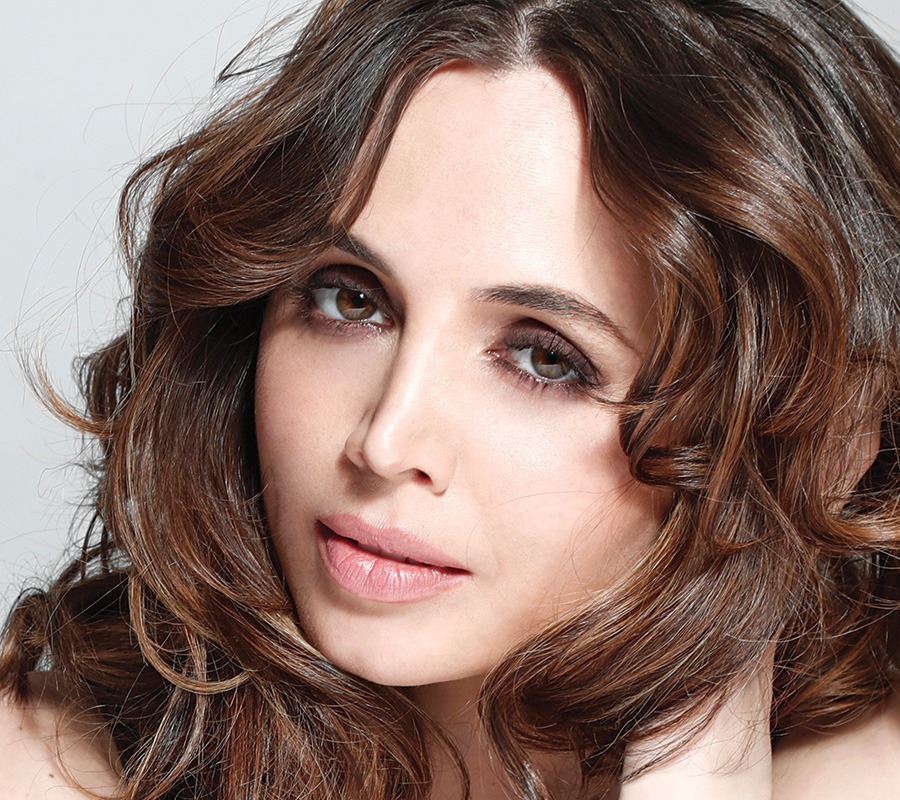The Interview: Actress and Producer Eliza Dushku
One of the city’s brightest stars on her rise to movie producer, the art of being brutally honest, and why Hollywood can’t ever seem to get Boston right.

Courtesy photo
Over the course of her acting career, Eliza Dushku has slayed vampires and overcome some of the most cutthroat cheerleaders to ever wave a pompom. But when I connected with her one recent evening, the Watertown native was staring down a far more terrifying adversary: a mountain of homework. And it wasn’t merely prep for her next role. The 38-year-old actor/producer/activist is busy grinding it out as a real-life undergraduate on her way to earning a degree in holistic psychology from Lesley University. As if that wasn’t enough, she’s also produced Mapplethorpe, a provocative biopic of controversial photographer Robert Mapplethorpe, which is sure to cause a stir when it premieres at Kendall Square Cinema this month.
It’s been almost 30 years since Robert Mapplethorpe set off a firestorm around public funding for controversial art, when a show that included images of BDSM and provocative nudes was canceled just months after he died. How did you end up producing Mapplethorpe in 2019?
It’s been about a 15-year journey. My brother—I sort of tripped and fell into the business through him—had gone to NYU and studied acting, and we were starting to think about producing projects together. While he was in New York, he met a screenwriter named Bruce Goodrich who handed him the original script for Mapplethorpe, and we were just moved by what an important figure and artist he was and is today. And we were surprised by how much the mainstream didn’t seem to know about Mapplethorpe or his work—and all the issues of censorship and First Amendment rights surrounding it. We just knew we had to tell his story.
So it’s been a 15-year-long labor of love?
Yes, and to be honest, it was a gnarly journey. I remember hearing about Salma Hayek trying to get the movie Frida made, and it took her something like 12 years. And I remember thinking, Twelve years—who would ever do that? But lo and behold. When we started, we were two young producers, and we sort of went down every alley you can imagine. We went to the Sundance labs, we went to writing and directing labs, we had various stars cast at different points. We partnered with director Ondi Timoner, a two-time Sundance Grand Jury Prize winner for her documentaries, and she started to rework the script. And finally, after many years, we were able to attach Matt Smith, but we were still on the verge of losing the rights to the project.
There’s a lot there with Mapplethorpe’s story: the relationship with Patti Smith, the celebrities, sex, controversy. Why was it so hard to get this movie off the ground?
As an arts movie with controversial content, we were having a hard time financing the movie and we had sort of hit up everyone in L.A. I came back to Boston for personal reasons and to go back to school, but I wasn’t going to walk away from the project. Mapplethorpe had passed away in Boston when he was undergoing treatment for AIDS, and I just felt like the film needed to come full circle and that I was going to fund the movie here. And that’s when we met [my future husband, Peter Palandjian] and some other Boston folks who really put their money where their mouth was. And now we have distribution in theaters starting in March.
Considering the issues of free speech addressed in the film—Mapplethorpe defending the nude and homoerotic images he took on artistic grounds—does the timing just feel right, given the current political climate?
It’s entirely relevant right now, and maybe more so than ever, given what we’re facing with the current administration and this sort of cultural divide our country is wrestling with. I think it’s horrifying to a lot of people because we came so far and now it feels like we’re going backward. And that’s alarming, especially to so many artists and members of the LGBTQ community. And so now more than ever, we have to fight. We have to fight for the freedom of the press. We have to fight for freedom of expression and art.
So, are you officially a Bostonian again?
I’d say I’m a full-time Bostonian yet again, and I’m really happy about it. L.A. was good to me for a lot of years, but to this day I still can’t believe I lived there for 18 years—that’s an honest effort. But I always considered myself a Boston girl through and through, and I always planned to come back.
And like so many people here, you’re a student.
You know, it’s been sort of my dream for 15 years to come back and go to school so I could shut people up. And I finally did it, and I love it. And my family is here, so I’ve had the opportunity to spend important time with them, and on top of all that I met my now-husband here.
Who did you want to shut up?
I think the loudest people I wanted to shut up were the voices in my own head. Growing up in Boston and growing up with my mom, who was a professor, it’s just a different culture around education than a lot of other places. And I always felt like I wanted to learn something that I could use to help other people, so I’m studying holistic psychology.
Are you getting the full college experience—reading papers until your eyes are on fire and frantically typing at 4 a.m.?
Oh my gosh, yes. I’ve been staring at my computer screen for the past three days trying to put together this portfolio for one of my classes. I’ve written more papers than I ever thought possible, but I’ve got to say that I freakin’ love it. And don’t get me wrong—there are amazing things about being an actor and doing red carpets and getting to go on Jimmy Kimmel, but this stuff gets me going.
Are you one of those students who sit in the front row and answer every question?
I don’t sit in the front row—I sit in the second row. I’m such a nerd, but maybe that’s because of the fact that my mom was a professor and my dad was a Boston Public Schools teacher.
Since coming back to Boston, what’s been your go-to lunch spot?
You’ll find me at Life Alive in Central Square a lot. That place is always packed, and I feel like I found a place that has a little bit of that California crunchy organic goodness.
This past summer you got married at Boston Public Library. What was that like?
Within days of someone suggesting it, we went to visit, and as soon as we walked into the courtyard we knew it was the place. And the second part of our wedding was that we walked out of the doors of the library and jumped into the Boston Bike Party with all of our guests and hundreds of strangers and rode through the streets. It was freakin’ epic. And then we went to the Barking Crab and had lobsters and really good seafood and danced all night. It doesn’t get any better.
Have you ever passed up a role that you regret not taking?
It’s always a little bit taboo to say these things because there’s a lot of secrets in Hollywood in terms of who gets offered what. But yeah—there was a role I was offered that was actually a Boston-based story that I loved. But I was really concerned about them getting Boston right. And they ended up wanting to shoot it in a completely different city and I just couldn’t do it there.
Is Hollywood’s perception of Boston that it’s full of people in Tom Brady jerseys, guzzling Dunks, and screaming about how they pahk the cah in Hahvahd Yahd?
Yeah, I kind of think so. Just as a viewer, you know as well as I do that that’s still sort of the rap. But I will say there’s so much great content out there that there have been a lot of great Boston stories that have come out and highlighted more than just the stereotypes. And I think there’s more to do, but the truth is that it’s so hard to re-create a Boston neighborhood if you don’t have the people. It’s a hard town to fake—if you’re not going to shoot here, you’re not going to get the authentic Boston experience. Which is why one of my wishes is to get more of the film business here.
Many of the characters that you’re famous for playing, such as Faith on Buffy the Vampire Slayer and Missy in Bring It On, are strong, outspoken women. Given the climate in Hollywood right now and what you’ve been known for lately, do you feel the culture is moving in the right direction?
You know, for many women, and men as well, it’s been an important year of reckoning. It’s liberating, and it shows that when we speak our truths—as terrifying as that might be—we afford ourselves a chance to heal. And we’re seeing that we also get a chance to create change for others, which for me is powerful and really important.
On that note, in 2017 you also talked with thousands of teenagers at the New Hampshire Youth Summit on Opioid Awareness about your sobriety, which you haven’t kept a secret but you’d never really talked about publicly before. How did that come about?
To be honest, I wasn’t even prepared to do that. A couple of friends had invited to me come check [the summit] out. And they had asked me to speak a few minutes before it started, and I spent the first hour and a half watching these thousands of students and everyone else in the room trying to understand this epidemic of people dying. And adults don’t necessarily know what to say to kids to try to create change—nobody really knows what to do. I guess I just felt responsible to try something. And in my experience, part of my own recovery came from hearing other people who were honest about their own recovery. At 38 years old, you just start to realize that you’re as sick as your secrets and you need to tell the truth about yourself.
Isn’t it stressful in the age of social media to go public with something like that?
Yeah, it can cause a bit of a panic attack. And to be honest, in the past couple of years, I’ve been on social media so much less because of that. I remember a therapist once saying to me that reading your reviews and what people say about you on Twitter is like putting a loaded gun to your head. And it’s just human nature that a thousand people could say you’re great and there’s one person that just drills into you, and that’s all you can focus on. And today with the trolls and the fake bots, it’s just too much.
It seems you’ve got a million things going on now, between school, producing, and acting. What are you most excited about?
I mean, being married is a big deal. I didn’t see that coming, but I’m pretty psyched about it. Finishing my bachelor’s degree is at the top of my list, and I’m getting there. I’m excited to start meeting a lot of people in the Boston community. We have some of the best minds in the world coming out of here, and I’m excited to be working with my peers here. And I’m excited to hopefully see some political change, which is high on my priority list.
On the political front, how does the pace of the news cycle not tire you out?
You know, it’s brutal. But I also think that while it’s important to be informed, you also have to get off the information train and get into action in whatever little or large way you can. I always think of the saying “How do you eat an elephant? One bite at a time.” So I just take my one little bite at a time.

